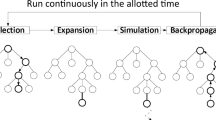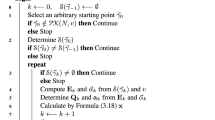Abstract
We study here the effect of concurrent greedy moves of players in atomic congestion games where n selfish agents (players) wish to select a resource each (out of m resources) so that her selfish delay there is not much. The problem of “maintaining” global progress while allowing concurrent play is exactly what is examined and answered here. We examine two orthogonal settings: (i) A game where the players decide their moves without global information, each acting “freely” by sampling resources randomly and locally deciding to migrate (if the new resource is better) via a random experiment. Here, the resources can have quite arbitrary latency that is load dependent. (ii) An “organised” setting where the players are pre-partitioned into selfish groups (coalitions) and where each coalition does an improving coalitional move. Our work considers concurrent selfish play for arbitrary latencies for the first time. Also, this is the first time where fast coalitional convergence to an approximate equilibrium is shown.
Similar content being viewed by others
References
Ackermann, H., Roeglin, H., Voecking, B.: On the impact of combinatorial structure on congestion games. In: FOCS (2006)
Awerbuch, B., Azar, Y., Fiat, A., Leighton, T.: Making commitments in the face of uncertainty: How to pick a winner almost every time. In: Proceedings of the 28th ACM Symposium on the Theory of Computing, pp. 519–530 (1996)
Babaoglu, O., Canright, G., Deutsch, A., Di Caro, G.A., Ducatelle, F., Gambardella, L.M., Ganguly, N., Jelasity, M., Montemani, R., Urnes, T.: Design patterns from biology for distributed computing. ACM Trans. Auton. Adapt. Syst. 1(1), 26–66 (2006)
Berenbrink, P., Friedetzky, T., Goldberg, L.A., Goldberg, P., Hu, Z., Martin, R.: Distributed selfish load balancing. In: SODA (2006)
Blum, A., Even-Dar, E., Ligett, K.: Routing without regret: on convergence to Nash equilibria of regret-minimizing algorithms in routing games. In: PODC (2006)
Cao, J., Nyberg, C.: An approximate analysis of load balancing using stale state information for servers in parallel. In: Proc. of the 2nd IASTED Int. Conf. on Communications, Internet, and Information Technology, November 2003
Chien, S., Sinclair, A.: Convergence to approximate Nash equilibria in congestion games. In: SODA (2007)
Cybenko, G.: Load balancing for distributed memory multiprocessors. J. Parallel Distrib. Comput. 7, 279–301 (1989)
Dahlin, M.: Interpreting stale load information. IEEE Trans. Parallel Distrib. Syst. 11(10), October 2001
Even-Dar, E., Mansour, Y.: Fast convergence of selfish rerouting. In: SODA (2005)
Fabrikant, A., Papadimitriou, C., Talwar, K.: The complexity of pure Nash equilibria. In: STOC (2004)
Fischer, S., Räcke, H., Vöcking, B.: Fast convergence to wardrop equilibria by adaptive sampling methods. In: STOC (2006)
Fischer, S., Vöcking, B.: Adaptive routing with stale information. In: PODC ’05: proceedings of the twenty-fourth annual ACM symposium on Principles of distributed computing, pp. 276–283. ACM Press, New York (2005)
Fotakis, D., Kontogiannis, S., Spirakis, P.: Selfish unsplittable flows. Theor. Comput. Sci. 348, 226–239 (2005)
Fotakis, D., Kontogiannis, S., Spirakis, P.: Atomic congestion games among coalitions. In: ICALP (2006)
Ghosh, B., Muthukrishnan, S.: Dynamic load balancing in parallel and distributed networks by random matchings. In: Proc. of the 6th Annual ACM Symposium on Parallel Algorithms and Architectures (SPAA), pp. 220–225 (1994)
Grenager, T., Powers, R., Shoham, Y.: Dispersion games: general definitions and some specific learning results. In: AAAI (2002)
Hayrapetyan, A., Tardos, E., Wexler, T.: The effect of collusion in congestion games. In: STOC (2006)
Ieong, S., McGrew, R., Nudelman, E., Shoham, Y., Sun, Q.: Fast and compact: a simple class of congestion games. In: AAAI (2005)
Koutsoupias, E., Papadimitriou, C.: Worst-case equilibria. In: Proc. of the 16th Annual Symposium on Theoretical Aspects of Computer Science (STACS ’99), pp. 404–413. Springer, Berlin (1999)
Mitzenmacher, M.: How useful is old information? IEEE Trans. Parallel Distrib. Syst. 11(1), 6–20 (2000)
Motwani, R., Raghavan, P.: Randomized Algorithms. Cambridge University Press, Cambridge (1995)
Rosenthal, R.W.: A class of games possessing pure-strategy Nash equilibria. Int. J. Game Theory 2, 65–67 (1973)
Sandholm, W.H.: Population Games and Evolutionary Dynamics. MIT Press (in press). http://www.ssc.wisc.edu/~whs/book/index.html
Sandholm, W.H.: Potential games with continuous player sets. J. Econ. Theory 97, 81–108 (2001)
Weibull, J.W.: Evolutionary Game Theory. MIT Press, Cambridge (1995)
Author information
Authors and Affiliations
Corresponding author
Additional information
This work was done while the 1st author was with the Department of Infomation and Communication Systems Engineering, University of the Aegean, Greece. The 2nd author was partially supported by the IST Program of the European Union under contract number IST-015964 (AEOLUS). The 3rd author is supported by EU ICTFET under grant 215270 “Foundations of Adaptive Networked Societies of Tiny Artefacts (FRONTS)”.
Rights and permissions
About this article
Cite this article
Fotakis, D., Kaporis, A.C. & Spirakis, P.G. Atomic Congestion Games: Fast, Myopic and Concurrent. Theory Comput Syst 47, 38–59 (2010). https://doi.org/10.1007/s00224-009-9198-2
Received:
Accepted:
Published:
Issue Date:
DOI: https://doi.org/10.1007/s00224-009-9198-2




